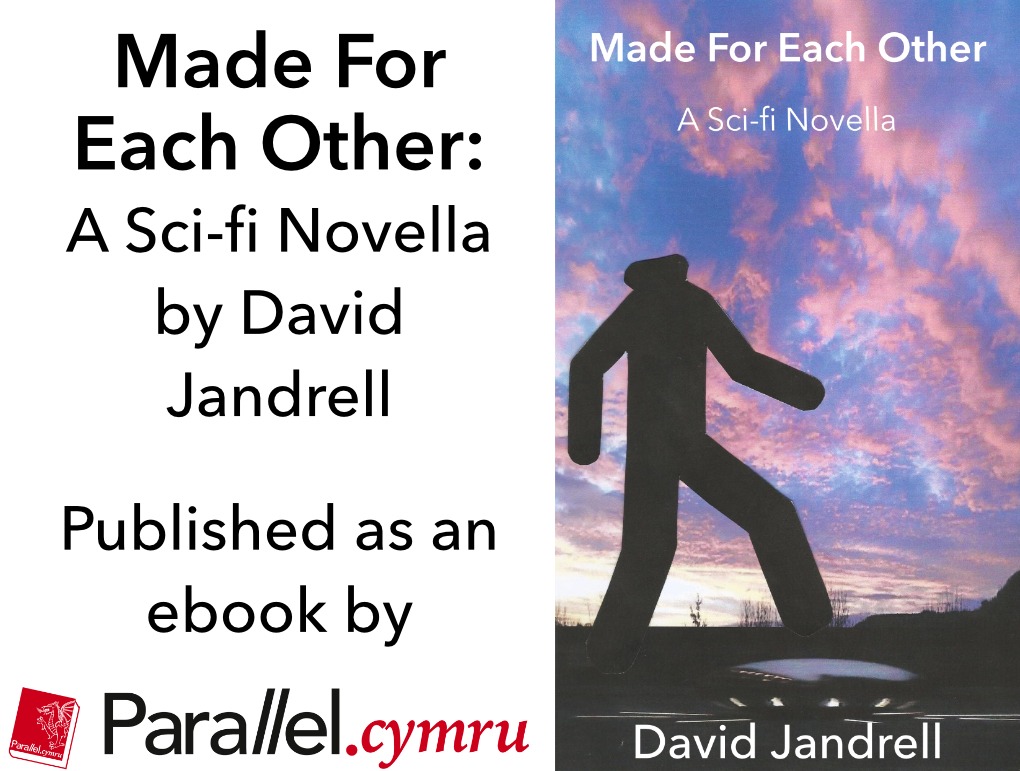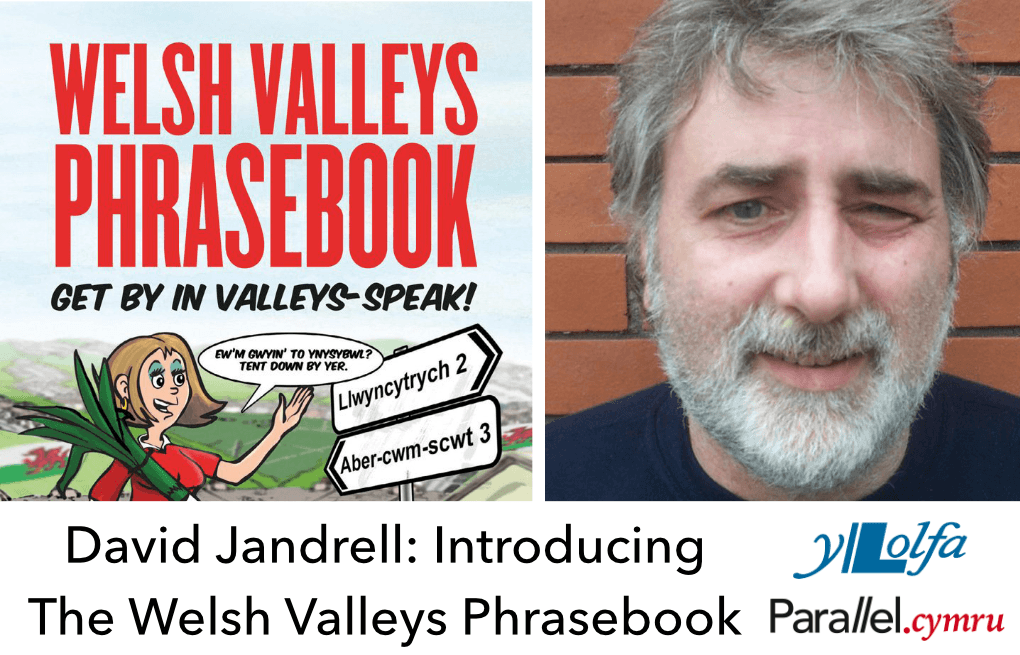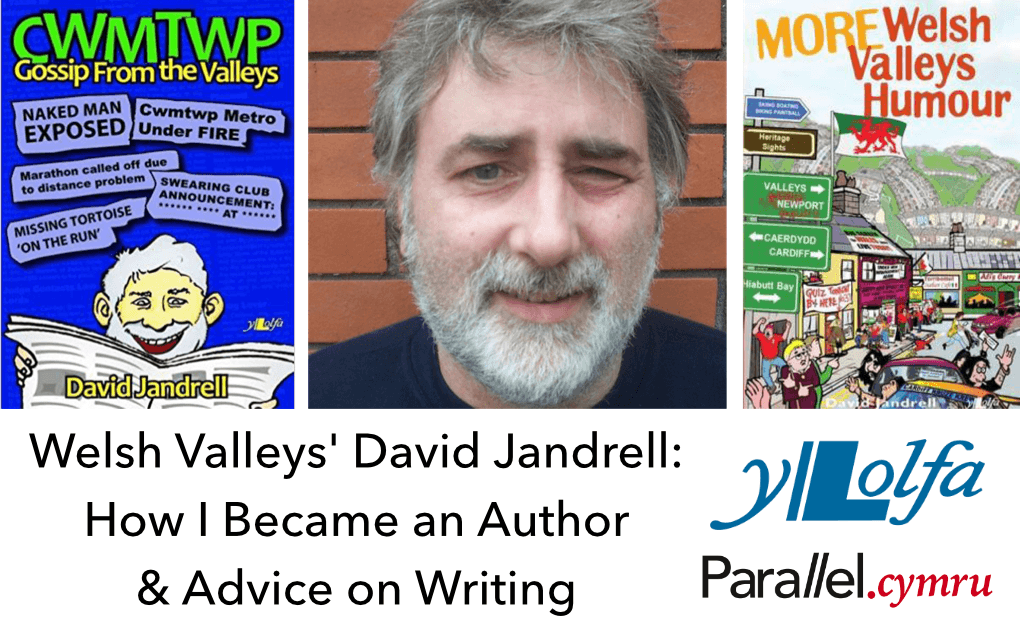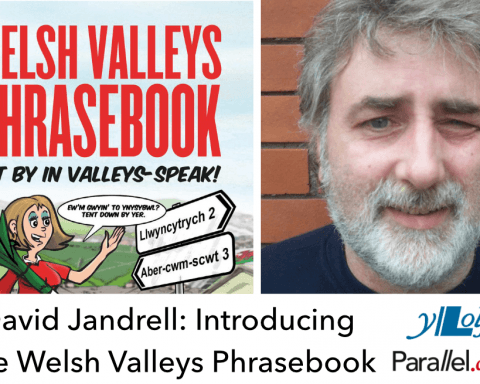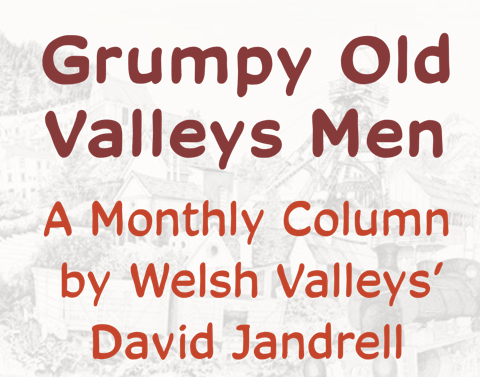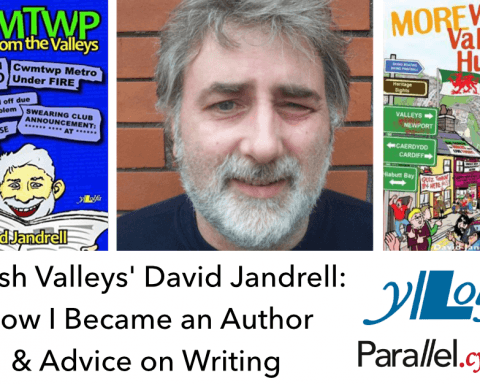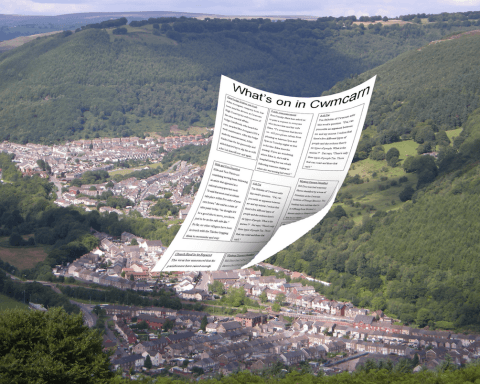David Jandrell is a best-selling author of Welsh Valleys dialect books- observing and commenting on the humourous way that people of South Wales speak. He then set himself the challenge of writing fiction- and to write a science fiction story. The challenge arose in that David only reads non-fiction, and had never read a scifi book in his life- making this a unique and distincitive novella. It follows an autistic man who is ejected from Earth for not being able to contribute to society, but his approach to problem-solving and communication enable him to overcome the obstacles he finds when his craft is drawn to a planetoid on the outskirts of the solar system and meets an all-knowing sentient entity.
Introduction to the novella
I suppose it’s fair to say that I was rather an awkward child – if you asked my teachers, that is. I grew up to be a scientist and I am a typical scientist, if you like – pragmatic, tunnel-vision, black is black, white is white and ne’er the twain. One of my best friends, a Professor Emeritus of Biochemistry and Immunology once said: “Scientists do tend to be a bit reductionist, but it must be said Dai, you are by far the most extreme I’ve ever come across.”
Even though I ‘grew up’ to be a stuffy old scientist, to be honest I was like it as a child. It must have been a nightmare trying to teach me. Well, I was fine in science and maths but I refused point blank to participate in anything that involved fiction – in other words, reading novels, poems and Shakespeare for the English literature classes that I had to endure throughout my school years.
Even as a small child, pre-school age, I could never fully engage with the things that we were bombarded with by our parents, teachers, aunties and uncles, friends, older siblings, etc. – fairy tales, the tooth fairy, Easter bunny, father Christmas et al.
These just didn’t make sense to me, I couldn’t actually commit fully to any of them and would say things like:
“I don’t believe a word of it!”
“You must be joking, do you think I’d fall for that?”
“I’m not having that, you must think I was born under a banana boat, or something.”
As you can see I was not fully au fait with my idioms at this time.
But, enough of that. I entered school (in 1959) with the philosophy that I could not afford any time to listen to, read or watch anything that I knew had been ‘made up’ before I started. What’s the point? It’s not real. Why bother? And I managed to maintain that attitude right through school.
Let’s fast forward to late 2015. By this time I had a good career behind me and was winding up my employmentary (not a word, but should be) commitments. Also, by this time I was ‘scienced-up to the hilt’ and had maintained my existence in my fiction-free bubble very efficiently.
I was also a published author and had received great success and won a few awards for the material that I had penned since 2003. Thankfully, my work had been classified by, ‘them what know’ as ‘non-fiction.’ Phew!
One day, I opened an email from the Open University – I suppose it was one of those that would be classed as spam by most people, even me to be fair, but my attention was drawn to the word ‘FREE’ that appeared in the subject field.
The email was advertising free short courses which covered the whole spectrum of academia so, I decided to scroll through the list, you know, just to see if there was anything that caught my eye.
Something did catch my eye actually, a short course entitled: ‘Start Writing Fiction.’ I clicked on the link and waited with great expectation.
It told of a six to eight week course which prepared budding novelists to begin to start to pen the book that they had inside them. Everyone has one inside them, apparently.
I decided to investigate this course. Even though I was an established published author, the whole fiction genre was a completely unknown area for me. ‘Why not?’ I thought. “It’s free anyway. Go for it.”
It was certainly something that, over the years, I had received a lot of ‘stick’ over, you know, being a fiction-free zone and I have had strong words with a few people who decided that I needed to be taken to task over my choice of reading material.
One ex-colleague saw it as his life’s mission to educate me and wean me into the world of fantasy that he had occupied for most of his life. He was certainly the ‘bestest-read’ person that he could think of and for some reason saw it as a quality to become a bit of a snob about.
“I just can’t understand why you don’t read, Dai.” He used to say.
Well, contrary to popular belief (or his anyway) I do read – I pointed out that I’d read over 1,000 books. The difference between our reading material was, the stuff I read was real and the stuff he read was made up.
“You can’t have any imagination, Dai,” he used to say, “filling your head with fact after fact.”
I said, “My imagination is such that I do not need to kick-start it into action with the contents of someone else’s imagination.” He didn’t speak to me for weeks after that one.
Anyway, I digress. Back to the story.
The course was pretty straightforward to start with and continued in that fashion. We (the learners and my peers) were given short passages of text that had been written by well known writers and they asked ‘us’ to critique each passage along the lines of:
“How has the author created tension here?”
“How do you think the main character is feeling at the moment? How good a picture has the writer painted about her dilemma.”
“The author has used very short, succinct and ‘punchy’ sentences here. “Why?”
And so on.
As the weeks went on, we were asked to critique our peers’ critiques of the same passages as gradually they taught us how to judge writers’ worth and to how express our thoughts and feelings using the written word.
The end of the course required ‘us’ to produce our own piece of writing and post it for our peers to critique using our newly acquired critiquing skills.
I think we had to write 1,000 – 1,500 words and I began to ponder what to write.
Fiction was a new thing for me. I hadn’t read any. What does it look like on the page? Arrggghhh!
I finally decided to explore science fiction – I mean, I’m a scientist aren’t I. I had always regarded the term ‘Science Fiction’ as an oxymoron. If it’s fiction, it can’t be scientific and if it’s scientific, it’s got to be fact, hasn’t it? I thought I’d explore that concept and see what happened. One thing I had to be vigilant about though, I had to make sure that any science in my passage would have to be correct. I didn’t want someone like me getting in touch and saying,
“Oi, you can’t say that! That’s nonsense, scientifically flawed. That could never happen. Philistine!”
So that was it then. A short piece of ‘correct’ sci-fi compacted into 1,000 words (always take the shortest option) and posted it up for vetting by the other people on the course.
I wrote a short passage concerning a person who was in a very dark place sometime into the future and things looked to be getting worse for him. At this point, I introduced another character and that, basically, was that. I entitled it, ‘Made for Each Other,’ posted it and awaited feedback.
I made sure that I encapsulated everything I wanted to do to create a mini-story, or at least a hint of a story within the constraints of the 1,000 word target that I had set myself.
I was quite shocked at the feedback that I got from my peers.
“Wow! That is brilliant. I’m hooked. Will you please post the rest of it?”
“Please, please, please can I see the rest of your novel. It’s very intriguing.”
“This is a monster. Are you going to get it published? Can’t wait.”
Hastily, I posted:
“Sorry everyone. I don’t have a story to tell. This was a stand alone piece of writing done purely to complete the course. I won’t be continuing with this but thanks for your kind words – very encouraging.”
I didn’t visit the site after that.
A few weeks later, I mentioned it to a friend who is a sci-fi guru and avid reader in that genre (two to three novels a week) and he asked me if I would show it to him. We worked in the same place so I emailed the story ‘upstairs.’
He was very complimentary and said that I should ‘finish it’. He told me he was going to nag me until I did.
Well, I get enough nagging at home and I didn’t want it in the workplace as well so I said I’d consider it – to appease him to be honest, I never really meant it. I mean, I didn’t have a story. That was the reality of the matter!
The next day, over coffee, I came clean and told him that I would not be continuing with ‘Made for Each Other.’ He ignored that and said, “The first thing you need to do is lose the title. Most writers decide on a title when their work is finished. You have two characters here and the inference here is that they’re going to end up together- it’s a bit cheesy. Your readers are going to expect a relationship. This expectation may put people off reading it.”
He suggested that I called my original 1,000 word piece 'Chapter One' and continue from there. He challenged me to write chapter two that evening and email it to him in the morning and he’d give me feedback on it. He also said that he would give me some words or phrases that he wanted incorporated into the story, just to see what happened. I can’t remember them all at the moment, but, the one that comes to mind at the time I am writing this was, ‘butter beans’. Very sci-fi I know, butter beans, but all the words and phrases that he gave me were just as random.
As things worked out, I ended up writing a chapter a night and emailed it to him every morning. When I got his emailed feedback, plus the obligatory random word/phrase, I had my task for that evening.
I also decided to keep the title and try to make it fit – as a challenge to myself.
After a while and, although I didn’t know it at the time, ‘twas about half way through the novel, my colleague said, “This is like nothing I’ve ever read before. It’s so diverse. Random. Bonkers, even. You’re a good way into this story I have absolutely no idea which way it is heading.”
I had to admit, “Well, if it’s any consolation to you, I don’t know either!”
Anyway, 33 working days later (I didn’t do it on weekends) I decided to wrap up the story very abruptly and made chapter thirty four the end of it. When I put the final full stop I was quite pleased that I had done it. It was a challenge to myself. I mean, I’m a fiction-free zone, aren’t I?
My colleague then decided to ask me to finish it. I told him it was finished; I wasn’t going to add to it.
He said that the end, if I was going to leave it at that, was typical of the rest of it. It was difficult to tell what was going to happen next – and when whatever did happen, it would be totally removed from what had gone on before it – but it worked. Continuity was sound and it actually fitted together as a story – despite the random words/phrases that he had chucked in. His view was that this piece of work was unique.
I was pleased when he said that he had not read anything like it before, but, not surprised really. I had no grounding in Sci-Fi and so I didn’t know how it looked on paper (does that make sense?) or how it was presented. I certainly wouldn’t have adopted another writer’s style as I hadn’t read anything by anyone else, I would have nothing to base my story on apart from whatever came into my head during those 33 evenings when I tapped away on my PC.
I gave it to some other seasoned Sci-Fi buffs to get a view from them to see how it sat in the genre – was it up to it? Is it good enough? Should I shelve it? Suggestions?
All feedback was good – the work sat well within the genre and was as good as some of the published material that was ‘on the shelves’. Although, one guy came back and said “Actually, this is not ‘Sci-Fi’, it’s ‘Dark Fantasy’.”
Well, that was a genre I’d never heard of before, or since for that matter. I wasn’t even sure what Sci-Fi was until I wrote the book and I’m still not sure I am now, so I decided that I wasn’t going to explore the ‘Dark Fantasy’ route, and still haven’t.
So, will it ever adorn the shelves of Waterstones or WH Smith’s? I don’t know- but I'm glad that it is going to be read digitally.
Chapter One of 'Made For Each Other'
He stood before a blank wall gazing at his muted reflection in the dull metal.
‘Enter!’ instructed a warm female voice. He became aware of a small aperture opening at chest height which silently and rapidly expanded until it was large enough for him to step through. He didn’t really want to be there. He didn’t know what to expect, but he was sure that, whatever the reason he had been summoned, it would be bad news.
He looked into a room that was quite bland and brightly lit. Walls, ceiling and floor merged seamlessly into an off-white, slightly shimmering void where two flat angular vivid blue shapes seemed to float in the otherwise featureless space. The larger and higher one he knew as a table, and on it a blank clear glass screen; the smaller one with two flat planes at right angles to each other was, he recalled, a seat. His parents had similar furniture in their living cell with shelves and couches, too, made of the same field controlled material.
Vertigo, and a slight feeling of nausea as he stepped over the threshold, and relief as a hesitant foot met the solid surface of the floor.
He advanced to the table and touched the seat with his right hand. He touched the seat with his left hand. He sat, felt the momentary give until the field adjusted to the new weight, and looked around. He tapped his left foot four times. He tapped his right foot four times.
“David. N456D19C. The council has completed the assessment and their findings will be relayed to you now.”
David looked around. The same warm female voice, but where did the voice come from? Not the screen as the voice filled the air, defying his attempt to establish its direction. He was alone. Who said that?
He swung round and surveyed the featureless room. No, there was definitely nobody else there.
“David. N456D19C. The council has completed the assessment and the findings will now be relayed to you.” Same pitch; same timbre.
“Hello?” said David.
“David. N456D19C. You have acknowledged your presence by speaking. Please confirm that you are David. N456D19C”
Still looking around, David replied, “David is my name. The N456 … thing, er, sounds right. Can’t be sure, I did know it when I was a kid. Knew it by heart when I attended Education, but that was years ago.”
“Voice recognition confirms that you are “David. N456D19C. Findings will begin. If you do not understand, you can speak to a mentor who will explain things fully, if you request it. The findings are final and are not negotiable. We are required by GM to give you this option, it is not compulsory, but citizens in similar positions have utilised counselling from mentors.”
“Before we start,” David began.
“This is not a discussion. The purpose of speaking to you today is to give you information only. It is not interactive. Once the information has been passed to you, the findings will be carried out. There will be a brief interim following this session where you may liaise with a mentor who will be skilled at dealing with people in your position. The meeting with your mentor will be for clarification purposes only. Whatever is discussed with your mentor will neither affect, nor delay your fate and the way in which it is implemented.”
“How do I get in touch with …..” David began. The voice interrupted.
“David. N456D19C. The council has completed the assessment and the findings will now be relayed to you. The cause of your parents’ deaths has been attributed to the virus EN17 class, BBR65RT strain. That is confirmed. You have no trace of the infection. That is confirmed. Your status was, and remains; ‘Cosseted’. This status is unacceptable. Your psychological assessments have been examined and your Aspergian condition confirmed. This condition has remained unchanged since the initial statement allocated to you when you were seven years old.
"As a Cosset and an Aspergian, you do not have the social skills to contribute to GM and as you are unaffected by any strain of EN17 class virus, your death is not imminent. You are 37 years old on this day and this could mean that you could live for another 75 to 80 years. GM has assessed the scope for contribution from you until your death, assuming that you reach life expectancy, and a negative value has been returned.
"As you have not committed any crimes, controlled termination will not be considered. Instead you will experience a Humane Level 7 Extradition which is the most appropriate course of action after taking all factors in your case into account.
"The information has now been relayed and you will soon be offered counselling. You must state whether you would like counselling when offered. If you do not, Humane Level 7 Extradition will commence immediately.”
Silence.
David sat and wondered about the meaning of the message he’d received. What now? He would like to know exactly what the message meant. Did he have to apply for an appointment with a counsellor? Was that information in the message? Did he miss it?
Humane Level 7 Extradition was it? What does that mean?
“David?”
He turned to his right. Standing by his side was a pretty lady. She was quite short, had long dark hair and a welcoming smile. David nodded.
“I am Natalie. I am a trained counsellor and mentor. I have expertise in Cossets, Aspergians and Humane Extraditions, Levels 3 to 7. Is there anything you’d like to discuss?”
“Yes,” said David, “there is something I’d like to discuss.”

